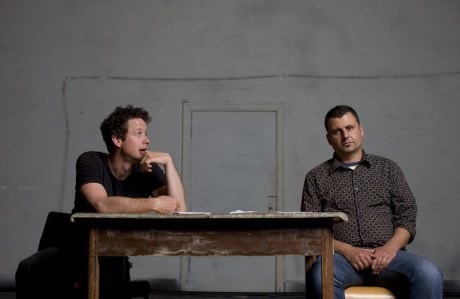I left Winners and Losers thinking, Wow, there’s more here than meets the eye. Or, as one of the performers said in an interview, “The show really bangs around in your head….”

On the face of it, Winners and Losers is both silly and serious, hilarious and sobering: It’s as if two friendly frat boys who are as funny, smart, and quick as Stephen Colbert and Jon Stewart were horsing around on an episode of Real World—joshing, jesting, tussling, showing off.
Now a hit at Woolly Mammoth Theatre Company, Winners and Losers has been wittily promoted with a photo of two men having a pissing match, literally aiming at a target in a urinal. The image is spot on. Winners and Losers plays like edgy two-hander standup comedy that turns into a verbal smack down.
Gradually the oneupsmanship game darkens. It appears to get out of hand. It seems to become a cruel duel. And a tense question arises: Will these best buds’ mano a mano contest be a deal-breaker for their camaraderie? And will it leave one of them victor, the other broken?
Winners and Losers is nothing less than a coup de théâtre, a collision of art and real life that appears to be happening in the moment—a dramatic encounter whose outcome is not only unknown to the audience; it may not be known to the two men who are the cast.
I cannot think of anything akin. It may well be a whole new professional performance form. As such it’s not to be missed.
The artists who set up that suspense each night on stage, partly scripted and partly adlibbed, are Marcus Youssef and James Long, two fortysomething actors from Canada who are both superb improvisers and storytellers. In life they are friends and collaborators; they created Winners and Losers as a vehicle for themselves, structured so they play two competitors to the point that we realize (and maybe worry) that they may not be playing.
Their estimable aim is to “explore this question of competition as thoroughly as possible.” As one said in an interview:
The weighing of “winner” or “loser” is a constant in our society from politics, to sports, to how you might encounter random people in the street. Us against them, this against that, me against you.
Competition when healthy and helpful is good for all of us — you might even call it collaboration. When competition is unhealthy, this usually means someone is playing at a disadvantage or another is playing unfairly or someone or something external is pitting people against each other.
Toward that purpose they begin by playing a game in which they name something kind of at random and declare whether it’s a winner or a loser. DC streetcars, Goldman Sachs, and Donald Trump were among the topics adjudicated to much amusement the night I saw the show.
As if to divert attention from the deeper stuff to come, Youssef and Long bandy about references to current events, income disparity, racism, and the like. Nothing really personal yet. Very Colbert–Stewart in its astute observations and progressive perspectives.
Then slyly the show segues into a series of contests and confrontations between the men that reference their own real lives—as friends, sons, husbands, and fathers. By the time the topic got to “Who is the better masturbator?” it was clear the ante had been upped. Youssef and Long play an actual game of Ping Pong as they banter with delivery that increasingly borders on derogation. Long steps out to pee and upon his return initiates an actual wrestling match, an intense struggle that I assumed to have been fight-choreographed but which seemed alarmingly convincing. As their entwined bodies rolled around, struggling to exert and extricate from one tense and tight muscular hold after another, it was as if two men were enacting their inability to express what it was they really needed and wanted: to embrace.
The universality of that epic undercurrent of suppressed male-male affection in men’s lives seems not to have been on Youssef and Long’s minds, not what their performance was meant to be “about,” not what they intended to “say.” Winners and Losers was silent on the point. But at that moment it howled out.
Youssef and Long are very self-aware in their various riffs about checking their privilege on vectors of wealth and ethnic heritage, which is a terrific strength of the piece. Youssef teases Long about wearing $200 jeans. Long taunts Youssef about being frugal while standing to inherit a bundle with his father dies. Neither is anywhere near impoverished, they admit. And together they acknowledge that Canada’s shameful treatment of its First Nations peoples is not something that happens to them.
But conspicuously lacking is any privilege checking on account of being men. There’s not an iota of such insight. Which is weird given how much the show has to say about what it means to be men.
Though the show’s worthy intent is to explore competition “as thoroughly as possible,” it does so with a blind spot. It assumes the ruse that the interpersonal competition between these two talented men—which, brilliantly, is the very form of the show’s incandescent content—is not gendered. Which is a crock.
Hello, these are two dudes having a cockfight. Just like men do incessantly to be men. One’s gotta be a loser so the other can be a winner. Happens day in and day out. It’s the socially engineered engine of unhealthy competition.
And ain’t that a pisser?
Running Time: 90 minutes, without an intermission.
Winners and Losers plays through November, 22 2015 at Woolly Mammoth Theatre Company – 641 D Street, NW, in Washington, DC. For tickets, call the box office at (202) 393-3939, or purchase them online.
LINK:
Lauren Katz’s review of Winners and Losers on DCMetroTheaterArts.





